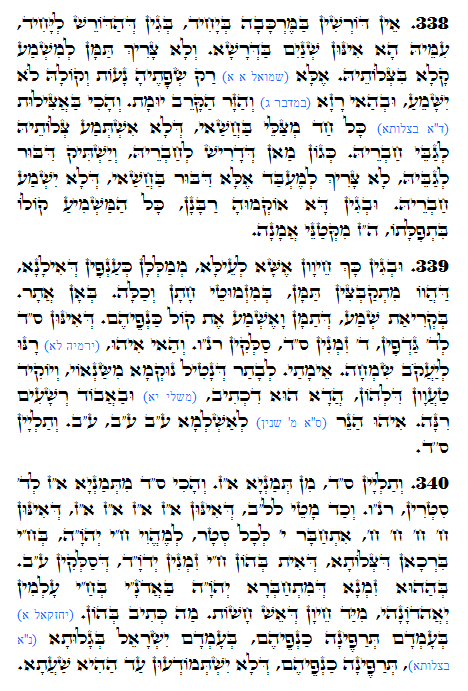Daily Zohar # 1189 – Pinchas – The power of affinity
Daily Zohar 1189
Daily Zohar 1189
Zohar Pinchas, Vol. 20 (English)/Vol 15 (Hebrew)

Hebrew translation:
339. וּמִשּׁוּם זֶה חַיּוֹת אֵשׁ לְמַעְלָה, מְדַבְּרוֹת כְּעַנְפֵי הָאִילָן, שֶׁהָיוּ מִתְקַבְּצוֹת שָׁם כְּמוֹ בְּשִׂמְחַת חָתָן וְכַלָּה. בְּאֵיזֶה מָקוֹם? בִּקְרִיאַת שְׁמַע, שֶׁשָּׁם וָאֶשְׁמַע אֶת קוֹל כַּנְפֵיהֶם, שֶׁהֵם ס”ד לְאַרְבַּע כְּנָפַיִם, אַרְבַּע פְּעָמִים ס”ד עוֹלִים רנ”ו. וְזֶהוּ (ירמיה לא) רָנּוּ לְיַעֲקֹב שִׂמְחָה. מָתַי? לְאַחַר שֶׁנּוֹטֵל נְקָמָה מִשּׂוֹנְאָיו וְיִשְׂרֹף הָאֱלִילִים שֶׁלָּהֶם. זֶהוּ שֶׁכָּתוּב (משלי יא) וּבַאֲבֹד רְשָׁעִים רִנָּה. שֶׁהוּא הַנֵּר (מ’ שָׁנִים) לְהַשְׁלִים ע”ב ע”ב ע”ב. וּתְלוּיִים ס”ד.
340. וּתְלוּיִים ס”ד מִשְּׁמוֹנֶה א”ז. וְכָךְ ס”ד מִשְּׁמוֹנֶה א”ז לְאַרְבָּעָה צְדָדִים – רנ”ו. וְכַאֲשֶׁר מַגִּיעַ לְל”ב, שֶׁהֵם א”ז א”ז א”ז א”ז, שֶׁהֵם ח’ ח’ ח’ ח’, מִתְחַבֶּרֶת אוֹת י’ לְכָל צַד, לִהְיוֹת ח”י יְהֹוָ”ה, בְּח”י בְּרָכוֹת שֶׁל הַתְּפִלָּה שֶׁיֵּשׁ בָּהֶן ח”י פְּעָמִים יְהֹוָ”ה, שֶׁעוֹלִים ע”ב. בַּזְּמַן הַהוּא שֶׁמִּתְחַבֵּר יְהֹוָ”ה בַּאדֹנָ”י עַל יְדֵי חַ”י הָעוֹלָמִים יְאֲהַדֹוָנָהי, מִיָּד חַיּוֹת שֶׁל אֵשׁ שׁוֹתְקוֹת. מַה כָּתוּב בָּהֶן? (יחזקאל א) בְּעָמְדָם תְּרַפֶּינָה כַנְפֵיהֶן. בַּעֲמִידָתָם שֶׁל יִשְׂרָאֵל בַּגָּלוּת (בַּתְּפִלָּה), תְּרַפֶּינָה כַנְפֵיהֶן, כְּדֵי שֶׁלֹּא יִוָּדְעוּ עַד הַשָּׁעָה הַהִיא.
Pinchas 338-340
1 Samuel 1:13
“וְחַנָּה, הִיא מְדַבֶּרֶת עַל-לִבָּהּ–רַק שְׂפָתֶיהָ נָּעוֹת, וְקוֹלָהּ לֹא יִשָּׁמֵעַ; וַיַּחְשְׁבֶהָ עֵלִי, לְשִׁכֹּרָה”
“Now Hannah, she spoke in her heart; only her lips moved, but her voice could not be heard; therefore, Eli thought she had been drunken.”
This verse from Samuel tells about Hannah who couldn’t have children and went to the Holy Tabernacle in Shiloh to pray before God.
Eli, the priest saw her moving her lips without a sound and thought that she was drunk.
The Zohar brings this verse to teach us a great lesson about spiritual connection. From that the secret of the next verse is revealed.
Numbers 3:10
“ וְאֶת-אַהֲרֹן וְאֶת-בָּנָיו תִּפְקֹד, וְשָׁמְרוּ אֶת-כְּהֻנָּתָם; וְהַזָּר הַקָּרֵב, יוּמָת.”
“And thou shalt appoint Aaron and his sons, that they may keep their priesthood; and the stranger that draweth nigh shall be put to death.’”
Why does the Torah say that only Aaron and the priests could serve in the Holy and the ‘strangers’ will be put to death?
The explanation is pretty simple. To make a connection on a higher level we need to have affinity with that level. If someone is ‘foreign’ to the level or the process then he can not make a connection.
Our prayers are constructed in a way that takes us in a spiritual elevation process through the spiritual worlds of Action (עשיה Asiah), Formation (יצירה Yetzirah) and Creation (בריאה Beriah) in order to reach the world of Emanation (אצילות Atziluth) with the silent prayer (Amida) where we can submit our prayers for supernal evaluation and consideration.
Hannah knew that by uttering words she would lower her connection to the world of Malchut (Asiah), that is far from Atziluth. The movement of the lips without a sound creates the energy that goes from the heart and the mind to the spiritual level of Atziluth.
The Zohar tells us that during his silent prayer (Amida) if the person utters the words with sound loud enough that the person next to him could hear, then he has little faith.
Jeremiah 17:10
“ אֲנִי יְהוָה חֹקֵר לֵב, בֹּחֵן כְּלָיוֹת: וְלָתֵת לְאִישׁ כִּדְרָכָו, כִּפְרִי מַעֲלָלָיו.”
“I YHVH search the heart, I try the reins, even to give every man according to his ways, according to the fruit of his doings.”
The energy that keeps the soul and body together is an extension of God. When we disconnect from the physical side of our existence, we can come closer to God with our heart and mind. During the standing prayer we should avoid any connection with the physical world. No sound, no looking at other people, not even checking the time on our watch. Time is the aspect of Malchut, which means falling down from Atzilut.
If one gets easily distracted by movements or sounds around him, then he should train himself to ignore that or use ear plugs to have uninterrupted connection when his soul is visiting the world of Atziluth.
If one makes the effort to pray then he should do it properly because God doesn’t use a security camera or a webcam to ‘spy’ on him. God is inside of us and the level of connection is determined by how far we disconnect from our body and selfish desires. Faking our prayers may impress flesh and blood, but not God.
Ezekiel 1:24
“ וָאֶשְׁמַע אֶת-קוֹל כַּנְפֵיהֶם כְּקוֹל מַיִם רַבִּים כְּקוֹל-שַׁדַּי, בְּלֶכְתָּם–קוֹל הֲמֻלָּה, כְּקוֹל מַחֲנֶה; בְּעָמְדָם, תְּרַפֶּינָה כַנְפֵיהֶן”
“And when they went, I heard the noise of their wings like the noise of great waters, like the voice of the Almighty, a noise of tumult like the noise of a host; when they stood, they let down their wings.”
The Zohar explains that the angels stop when we are in the silent standing prayer so they can feel (חשות) us. See DZ 1169 https://dailyzohar.com/daily-zohar-1169/
To have affinity with the Zohar we need to follow its teaching. Most organizations and Kabbalah teachers, especially outside Israel take this part of the Zohar teaching very lightly. Most people would love to have ‘discounted’ spiritual connection but the truth is that if we don’t follow the spiritual technology that the Zohar reveals to us from the Torah, then we do not have the affinity required to draw the light.
Women may not need to do all the prayers that a man does but they should do their best to connect. If you just go for Shabbat services, put 100% effort to maximize on the prayers especially Shema Yisrael, Amida, listens to the Torah and Mussaf.
Even if you pay your rabbi or teacher tons of money to pray for you, the silent prayer is yours alone. Your heart and mind should have the affinity needed to carry your prayers for health, wealth and fruitful relationships.
{||}

 Previous: Pinchas
Previous: Pinchas
